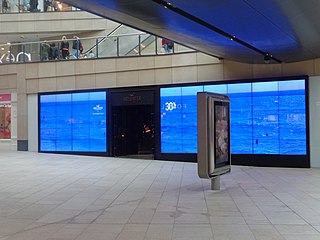Espionage, spying, or intelligence gathering is the act of obtaining secret or confidential information (intelligence). A person who commits espionage is called an espionage agent or spy. Any individual or spy ring, in the service of a government, company, criminal organization, or independent operation, can commit espionage. The practice is clandestine, as it is by definition unwelcome. In some circumstances, it may be a legal tool of law enforcement and in others, it may be illegal and punishable by law.

Sales are activities related to selling or the number of goods sold in a given targeted time period. The delivery of a service for a cost is also considered a sale. A period during which goods are sold for a reduced price may also be referred to as a "sale".

A partnership is an agreement where parties agree to cooperate to advance their mutual interests. The partners in a partnership may be individuals, businesses, interest-based organizations, schools, governments or combinations. Organizations may partner to increase the likelihood of each achieving their mission and to amplify their reach. A partnership may result in issuing and holding equity or may be only governed by a contract.

Operation Ranch Hand was a U.S. military operation during the Vietnam War, lasting from 1962 until 1971. Largely inspired by the British use of chemicals 2,4,5-T and 2,4-D during the Malayan Emergency in the 1950s, it was part of the overall herbicidal warfare program during the war called "Operation Trail Dust". Ranch Hand involved spraying an estimated 19 million U.S. gallons (72,000 m3) of defoliants and herbicides over rural areas of South Vietnam in an attempt to deprive the Viet Cong of food and vegetation cover. Areas of Laos and Cambodia were also sprayed to a lesser extent. According to the Vietnamese government, the chemicals caused 400,000 deaths. The United States government has described these figures as "unreliable".

A fiduciary is a person who holds a legal or ethical relationship of trust with one or more other parties. Typically, a fiduciary prudently takes care of money or other assets for another person. One party, for example, a corporate trust company or the trust department of a bank, acts in a fiduciary capacity to another party, who, for example, has entrusted funds to the fiduciary for safekeeping or investment. Likewise, financial advisers, financial planners, and asset managers, including managers of pension plans, endowments, and other tax-exempt assets, are considered fiduciaries under applicable statutes and laws. In a fiduciary relationship, one person, in a position of vulnerability, justifiably vests confidence, good faith, reliance, and trust in another whose aid, advice, or protection is sought in some matter. In such a relation, good conscience requires the fiduciary to act at all times for the sole benefit and interest of the one who trusts.
A fiduciary is someone who has undertaken to act for and on behalf of another in a particular matter in circumstances which give rise to a relationship of trust and confidence.

Corporate law is the body of law governing the rights, relations, and conduct of persons, companies, organizations and businesses. The term refers to the legal practice of law relating to corporations, or to the theory of corporations. Corporate law often describes the law relating to matters which derive directly from the life-cycle of a corporation. It thus encompasses the formation, funding, governance, and death of a corporation.

VG is a "V-series" nerve agent chemically similar to the better-known VX nerve agent. Tetram is the common Russian name for the substance. Amiton was the trade name for the substance when it was marketed as an insecticide by ICI in the mid-1950s.
Property management is the operation, control, maintenance, and oversight of real estate and physical property. This can include residential, commercial, and land real estate. Management indicates the need for real estate to be cared for and monitored, with accountability for and attention to its useful life and condition. This is much akin to the role of management in any business.
Vicarious liability is a form of a strict, secondary liability that arises under the common law doctrine of agency, respondeat superior, the responsibility of the superior for the acts of their subordinate or, in a broader sense, the responsibility of any third party that had the "right, ability, or duty to control" the activities of a violator. It can be distinguished from contributory liability, another form of secondary liability, which is rooted in the tort theory of enterprise liability because, unlike contributory infringement, knowledge is not an element of vicarious liability. The law has developed the view that some relationships by their nature require the person who engages others to accept responsibility for the wrongdoing of those others. The most important such relationship for practical purposes is that of employer and employee.

A talent manager is an individual who guides the professional career of artists within the entertainment industry. The responsibility of a talent manager is to oversee the day-to-day business affairs of an artist. This frequently involves how they advise and counsel talent concerning professional matters alongside the making of long-term plans and other personal decisions that may affect the entertainer's career.
A freight forwarder or forwarding agent is a person or a company who co-ordinates and organizes the movement of shipments on behalf of a shipper by liaising with carriers. The carriers may use a variety of shipping modes, including ships, airplanes, trucks, and railroads, and often use multiple modes for a single shipment. A freight forwarder does not move the goods but acts as an agent in the logistics network and will carry out freight consolidation, rate negotiations, shipment tracking, customs and other documentation, among other tasks. FIATA describes a freight forwarder as the "architect of transport".

A company, abbreviated as co., is a legal entity representing an association of legal people, whether natural, juridical or a mixture of both, with a specific objective. Company members share a common purpose and unite to achieve specific, declared goals.
Book packaging is a publishing activity in which a publishing company outsources the myriad tasks involved in putting together a book—writing, researching, editing, illustrating, and even printing—to an outside company called a book-packaging company. Once the book-packaging company has produced the book, they then sell it to the final publishing company.
A buyer brokerage or buyer agency is the practice of real estate brokers and their agents representing a buyer in a real estate transaction rather than, by default, representing the seller either directly or as a sub-agent. In the United Kingdom and Australia, the most common term is buying agent.
Commissions are a form of variable-pay remuneration for services rendered or products sold. Commissions are a common way to motivate and reward salespeople. Commissions can also be designed to encourage specific sales behaviors. For example, commissions may be reduced when granting large discounts. Or commissions may be increased when selling certain products the organization wants to promote. Commissions are usually implemented within the framework on a sales incentive program, which can include one or multiple commission plans.

Dopexamine is a synthetic analogue of dopamine that is administered intravenously in hospitals to reduce exacerbations of heart failure and to treat heart failure following cardiac surgery. It is not used often, as more established drugs like epinephrine, dopamine, dobutamine, norepinephrine, and levosimendan work as well. It works by stimulating beta-2 adrenergic receptors and peripheral dopamine receptor D1 and dopamine receptor D2. It also inhibits the neuronal re-uptake of norepinephrine.

Stocks consist of all the shares by which ownership of a corporation or company is divided. A single share of the stock means fractional ownership of the corporation in proportion to the total number of shares. This typically entitles the shareholder (stockholder) to that fraction of the company's earnings, proceeds from liquidation of assets, or voting power, often dividing these up in proportion to the number of like shares each stockholder owns. Not all stock is necessarily equal, as certain classes of stock may be issued, for example, without voting rights, with enhanced voting rights, or with a certain priority to receive profits or liquidation proceeds before or after other classes of shareholders.
A shipping agency, shipping agent, or ship agency is the term used to refer to the appointed companies that handle operational and procedural (legal) requirements for a commercial vessel's call at a port for the purposes of cargo handling (loading/discharging), emergency calls, repairs, crew changes, or ship demolition, and protect the general interests of their principals on behalf of ship owners, disponent owners, or charterers in an objective manner.
Matigsalug is a Manobo language of Mindanao in the Philippines. It belongs to the Austronesian language family.

Touching Evil is an American crime drama television series, based on the British series of the same name created by Paul Abbott. It starred Jeffrey Donovan as Detective David Creegan and Vera Farmiga as Creegan's partner Detective Susan Branca. Brian Markinson, Kevin Durand and Zach Grenier co-starred. The premise of this adaptation was somewhat different from the UK series' storyline. Rather than acquiring the ability to sense criminals, Creegan's recovery from a gunshot wound to the head instead strips him of his impulse control and sense of shame.









